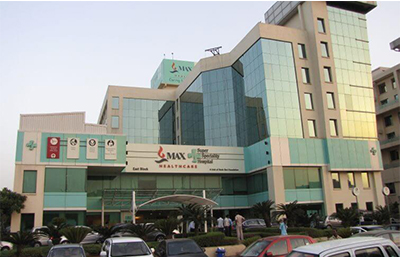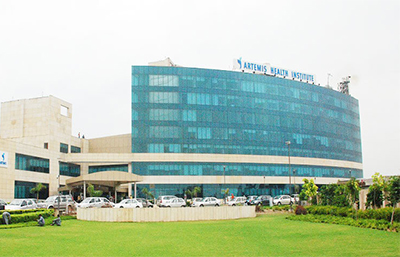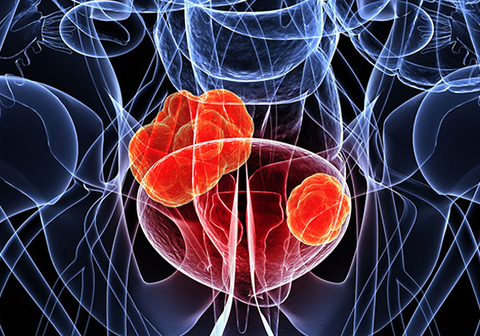Bladder cancer is the rapid, uncontrolled, and abnormal growth of the cells of the walls of the urinary bladder. It stands in the ninth place among the other types of cancers in the world. Bladder cancer can be either non-invasive (i.e. restricted to only the inner lining of the bladder) or invasive (i.e. which spreads to the inner walls of the bladder) or advanced bladder cancer (which has spread to the other body parts).
Causes
Bladder cancer is caused due to changes in the cells of the bladder which occurs most often with chemical exposure. Mutations in the DNA of the cells can change the growth and division cycle thereby causing an uncontrolled mass of tumor cells.
Symptoms
- Blood in urine (hematuria) which is usually painless
- Back pain or pain in the lower part of tummy
- Urinary symptoms such as burning sensation while passing urine, urinary frequency or urgency
If bladder cancer reaches advanced stages, then you may have pelvic pain, swelling of legs, bone pain, and an unintentional weight loss.
If you have the above symptoms, it does not necessarily mean that you have bladder cancer. However, it is important for you to get evaluated by a general physician (GP) because it is possible to cure cancer when it is in the early stage.
Other Risk Factors
The following conditions increase your risk of getting bladder cancer:
- Tobacco: The biggest risk factor for bladder cancer is smoking. Nearly 1 in 3 cases of bladder cancer is due to smoking.
- Chemical Exposure: Chemicals:Exposure to certain chemicals is found to be the cause of bladder cancer in nearly 25% of the reported cases. Examples of such chemicals are dyes, paints, rubber, plastic, leather tanning, etc.
- Age: As you age, your risk for bladder cancer increases. The risk is high in people aged above 40 years.
- Gender: Men are more likely to develop bladder cancer over women.
- Family History: A slightly higher risk is seen in people with a family history of bladder cancer.
- Infection: Urinary infections and bladder stones are also linked to bladder cancer risk. Infections are more common in people who are paralyzed.
- History of Cancers: If you have been treated for other types of cancers either with radiations to the pelvis or chemotherapy drugs, then your risk for bladder cancer increases.
Complications:
Either due to the condition or due to the treatment, certain complications can occur in the patient, impacting the daily life.
- Emotional Disruption: The patient may have a feeling of sadness with the diagnosis of bladder cancer, and may not enjoy anything. In severe cases, it can also lead to depression.
- Sexual Problems:Problems such as erectile dysfunction (with radical cystectomy) or narrowing of the vagina (with radiotherapy and cystectomy) are possible.
- Infections: If you have undergone surgical procedures for your bladder cancer treatment, then you are more likely to get infected.
Contact your physician if you are experiencing any of the above complications as they are treatable.
- Chronic epididymitis
- Formation of abscess in the scrotum
- Permanent damage to your epididymitis
- Reduced fertility
Diagnosis
Your doctor asks about your symptoms, family history, medical history, and if you have been exposed to specific chemicals, to get an initial clue regarding the condition.
A urine sample is collected to test for the presence of blood, abnormal cells or bacteria. Physical examination of your rectum and vagina are performed to check for the presence of lumps of bladder cancer which press the organs. Further tests, as mentioned below will be performed if bladder cancer is suspected
- Cystoscopy: To examine the inside of your urinary bladder through the images produced by the cystoscope
- CT Scan & Mri: CT Scan & MRI Performed if a more detailed image of the bladder is required
- Urogram: To get the whole picture of your urinary system
Bladder Cancer Treatment in India
Superficial tumors of lower grade (non-invasive) cancers are treated through transurethral resection of the bladder tumor (TURBT) followed by a dose of chemotherapy (which is optional) to reduce recurrence. Here, only the tumor is surgically removed through the urethra leaving the bladder intact.
If the stage is of higher grade and has high chances of recurrence, then Bacillus Calmette-Guérin (BCG) medication is injected into the bladder. This type of invasive cancer is removed surgically by removing the bladder completely by the procedure called cystectomy. As the bladder is removed, other operations for collecting urine are performed simultaneously. If surgery is not advisable, then chemotherapy and radiotherapy is recommended.
You may take certain precautionary steps to help your.
- Go for Bladder Cancer Treatment In Delhi, India
- Avoid the risk factors which increase the risk of bladder cancer.
- Bladder cancer may be prevented with a diet rich in fruits and vegetables, and low in fats.










